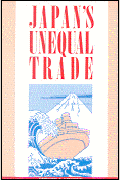With all the rapid economic success in Japan, it is easy to forget just how insular the nation has been, and how strikingly different its trading patterns remain from those of other industrialized nations. Japan is moving into an era of greater interaction with the world, but Lincoln contends that this does not mean the United States and other nations can end their pressure on Japan to continue opening its markets. “Now is the time to bring Japan into the fold,” Lincoln writes in his introduction.
Lincoln focuses on the question of access to Japanese markets, Japan’s pattern of trade on imports, and the consequences of large trade and current-account imbalances. He argues against the United States abandoning its free-trade ideal and offers suggestions for applying pressure to encourage greater real access to Japanese markets.
Author
Edward J. Lincoln is a senior fellow in Asia and Economic Studies at the Council on Foreign Relations. His previous Brookings books include Arthritic Japan (2001), Troubled Times: U.S.-Japan Trade Relations in the 1990s (1999), Japan's New Global Role (1995), and Japan's Unequal Trade (1990). In the mid-1990s, Lincoln served as special economic advisor to Walter Mondale, former U.S. ambassador to Japan.

